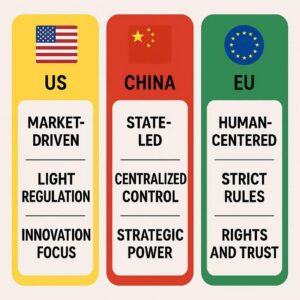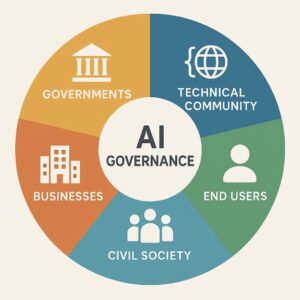Let me ask you something, Did you ever think about who decides for you what shows up in your YouTube feeds as recommendations? Or why some content shows up for you as Netflix recommendations? Or how your email knows what is spam?
If you’re like most people I’ve come across, the answer is probably “never.” And honestly, that makes total sense, you’ve got better things to do than worry about the invisible machinery of the Internet (I’ve been like that too).
But here’s the thing, someone somewhere is making those decisions. And right now, they’re making a lot more decisions about your digital life than you might realize.
The AI That’s Already Running Your Day
Recently, I have been spending some time thinking about stuff like this. This is as a result of my volunteering activities with ICANN as part of its At-Large Advisory Committee (fancy name, but basically it’s where regular Internet users get to weigh in on how the Internet works). And one question keeps coming up in my mind: “Why should I care or not care about AI governance?”
One thing is now certain, AI isn’t some sci-fi future thing, it is here. It’s the reason your phone knew to suggest that new playlist last week. It’s what decided which news articles you saw this morning. It filtered out those annoying spam emails and probably influenced what you bought online.
AI is quietly running your digital life. And someone had to write the rules for how it does that.
The Problem: Three Chefs, One Kitchen
So who is writing these rules? Right now, there are mainly three major players, and they each have completely different ideas about how AI should work:
 (An AI generated image of the world players in AI)
(An AI generated image of the world players in AI)
🇺🇸 The US approach: “Let companies innovate fast, figure out rules later”
🇪🇺 The EU approach: “Protect people first, innovate carefully”
🇨🇳 The Chinese approach: “Government oversight keeps everything stable”
Now imagine you’re trying to cook a meal, but three different chefs are giving you conflicting instructions. That’s basically what’s happening with AI governance right now.
The result? A global governance gap. While these major powers are busy pulling in different directions, regular Internet users like you and I are caught in the middle, sometimes protected, sometimes not, often confused about what rules even apply.
What This Actually Means for You
I read a research paper recently (yes, I read research papers – blame it on my work environment), and it described this as a “collective action problem.” But here is a common saying, when everyone only looks out for themselves, everyone ends up worse off.
Think about it from this perspective; if AI systems aren’t coordinated globally, you might face:
- Biased algorithms that make unfair decisions about jobs, loans, or healthcare
- Misinformation that spreads because different systems can’t work together to stop it
- Privacy violations that fall through regulatory cracks
- Digital divides where some people get amazing AI benefits while others get left behind
It’s like having different traffic rules in every neighborhood. Technically possible, but pretty messy to navigate every time.
The Solution: More Voices, Not Fewer
The interesting part is that we’ve actually solved this kind of problem before.
Do you know how the Internet works seamlessly across borders? or How do you send an email from your phone in Lagos to someone in London without asking permission from any government? Well, that’s because of something called polycentric governance, basically, a system where lots of different groups work together instead of one entity controlling everything.
It’s like having multiple layers of decision-making:
- Global organizations set broad standards
- Regional groups adapt them to local contexts
- National governments create laws
- Industry players build the technology
- Civil society groups advocate for users
- And regular users like you and I provide real-world feedback
This multistakeholder approach is exactly how ICANN works, and it is why no single government controls the Internet’s domain name system. Different voices balance each other out.
Your Voice Actually Matters
Here’s the part that might surprise you; your perspective matters in this conversation.
I’m not talking about becoming an AI expert or spending hours reading policy documents. I’m talking about the fact that you’re the one actually living with these systems every day. You know when an algorithm gets something wrong about you. You notice when AI recommendations feel creepy or helpful. You experience the real-world impact of these decisions.
Decisions about AI shouldn’t just be made in Washington, Beijing, or Brussels by people who’ve never had to deal with a biased job application algorithm or watched misinformation spread through their community.
These decisions need to include voices from everywhere, your city, your culture, your perspective on what fairness and privacy actually mean in practice.
The Bottom Line
Just like ICANN makes sure no single power dominates how the Internet’s basic infrastructure works, we need global AI governance that ensures no single entity gets to decide how AI shapes all our lives.
 (An AI generated image of polycentric AI governance)
(An AI generated image of polycentric AI governance)
And the crucial part to it is that if regular users don’t speak up, those rules will get written without us. But we’re the ones who have to live with whatever gets decided.
AI governance isn’t just a tech issue, it’s fundamentally a people issue. Because at the end of the day, AI is supposed to serve humans, not the other way around.
So the next time someone asks you why do you care about AI governance, you can tell them that it is because every Internet user has a stake in how these systems work. Including you.
Share your thoughts with me in the comments.
Want to get involved? Start by paying attention to how AI affects your daily life.
You can also look into organizations like ICANN’s At-Large community, and learn how regular users actually get a say in how digital systems are governed. Your voice is needed in this conversation.
